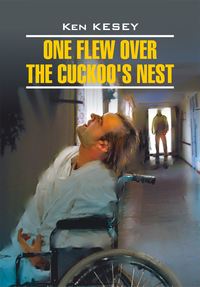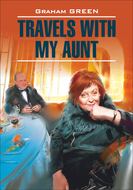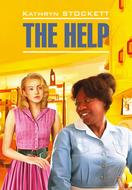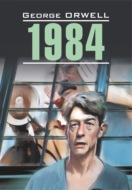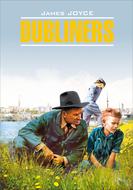Kitabı oku: «One Flew over the Cuckoo's Nest / Пролетая над гнездом кукушки. Книга для чтения на английском языке», sayfa 4
5
Before noontime they’re at the fog machine again but they haven’t got it turned up full; it’s not so thick but what I can see if I strain real hard. One of these days I’ll quit straining and let myself go completely, lose myself in the fog the way some of the other Chronics have, but for the time being I’m interested in this new man – I want to see how he takes to the Group Meeting coming up.
Ten minutes to one the fog dissolves completely and the black boys are telling Acutes to clear the floor for the meeting. All the tables are carried out of the day room to the tub room across the hall – leaves the floor, McMurphy says, like we was aiming to have us a little dance.
The Big Nurse watches all this through her window. She hasn’t moved from her spot in front of that one window for three solid hours, not even for lunch. The dayroom floor gets cleared of tables, and at one o’clock the doctor comes out of his office down the hall, nods once at the nurse as he goes past where she’s watching out her window, and sits in his chair just to the left of the door. The patients sit down when he does; then the little nurses and the residents straggle in. When everybody’s down, the Big Nurse gets up from behind her window and goes back to the rear of the Nurses’ Station to that steel panel with dials and buttons on it, sets some kind of automatic pilot to run things while she’s away, and comes out into the day room, carrying the log book and a basketful of notes. Her uniform, even after she’s been here half a day, is still starched so stiff it don’t exactly bend any place; it cracks sharp at the joints with a sound like a frozen canvas being folded.
She sits just to the right of the door.
Soon as she’s sat down, Old Pete Bancini sways to his feet and starts in wagging his head and wheezing. “I’m tired. Whew. O Lord. Oh, I’m awful tired…” the way he always does whenever there’s a new man on the ward who might listen to him.
The Big Nurse doesn’t look over at Pete. She’s going through the papers in her basket. “Somebody go sit beside Mr. Bancini,” she says. “Quiet him down so we can start the meeting.”
Billy Bibbit goes. Pete has turned facing McMurphy and is lolling his head from side to side like a signal light at a railroad crossing. He worked on the railroad thirty years; now he’s wore clean out but still’s functioning on the memory.
“I’m ti-i-uhd,” he says, wagging his face at McMurphy. “Take it easy, Pete,” Billy says, lays a freckled hand on Pete’s knee.
“…Awful tired…”
“I know, Pete” – pats the skinny knee, and Pete pulls back his face, realizes nobody is going to heed his complaint today. The nurse takes off her wrist watch and looks at the ward clock and winds the watch and sets it face toward her in the basket. She takes a folder from the basket.
“Now. Shall we get into the meeting?”
She looks around to see if anybody else is about to interrupt her, smiling steady as her head turns in her collar. The guys won’t meet her look; they’re all looking for hangnails. Except McMurphy. He’s got himself an armchair in the corner, sits in it like he’s claimed it for good, and he’s watching her every move. He’s still got his cap on, jammed tight down on his red head like he’s a motorcycle racer. A deck of cards in his lap opens for a one-handed cut, then clacks shut with a sound blown up loud by the silence. The nurse’s swinging eyes hang on him for a second. She’s been watching him play poker all morning and though she hasn’t seen any money pass hands she suspects he’s not exactly the type that is going to be happy with the ward rule of gambling for matches only. The deck whispers open and clacks shut again and then disappears somewhere in one of those big palms.
The nurse looks at her watch again and pulls a slip of paper out of the folder she’s holding, looks at it, and returns it to the folder. She puts the folder down and picks up the log book. Ellis coughs from his place on the wall; she waits until he stops.
“Now. At the close of Friday’s meeting… we were discussing Mr. Harding’s problem… concerning his young wife. He had stated that his wife was extremely well endowed in the bosom and that this made him uneasy because she drew stares from men on the street.” She starts opening to places in the log book; little slips of paper stick out of the top of the book to mark the pages. “According to the notes listed by various patients in the log, Mr. Harding has been heard to say that she ‘damn well gives the bastards reason to stare.’ He has also been heard to say that he may give her reason to seek further sexual attention. He has been heard to say, ‘My dear sweet but illiterate wife thinks any word or gesture that does not smack of brickyard brawn and brutality is a word or gesture of weak dandyism.’ ”
She continues reading silently from the book for a while, then closes it.
“He has also stated that his wife’s ample bosom at times gives him a feeling of inferiority. So. Does anyone care to touch upon this subject further?”
Harding shuts his eyes, and nobody else says anything. McMurphy looks around at the other guys, waiting to see if anybody is going to answer the nurse, then holds his hand up and snaps his fingers, like a school kid in class; the nurse nods at him.
“Mr. – ah – McMurry?”
“Touch upon what?”
“What? Touch – ”
“You ask, I believe, ‘Does anyone care to touch upon – ’ ”
“Touch upon the – subject, Mr. McMurry, the subject of Mr. Harding’s problem with his wife.”
“Oh. I thought you mean touch upon her – something else.”
“Now what could you – ”
But she stops. She was almost flustered for a second there. Some of the Acutes hide grins, and McMurphy takes a huge stretch, yawns, winks at Harding. Then the nurse, calm as anything, puts the log book back in the basket and takes out another folder and opens it and starts reading.
“McMurry, Randle Patrick. Committed by the state from the Pendleton Farm for Correction. For diagnosis and possible treatment. Thirty-five years old. Never married. Distinguished Service Cross in Korea, for leading an escape from a Communist prison camp. A dishonorable discharge, afterward, for insubordination. Followed by a history of street brawls and barroom fights and a series of arrests for Drunkenness, Assault and Battery, Disturbing the Peace, repeated gambling, and one arrest – for Rape.”
“Rape?” The doctor perks up.
“Statutory, with a girl of – ”
“Whoa. Couldn’t make that stick,” McMurphy says to the doctor. “Girl wouldn’t testify.”
“With a child of fifteen.”
“Said she was seventeen, Doc, and she was plenty willin’.” “A court doctor’s examination of the child proved entry, repeated entry, the record states – ”
“So willin’, in fact, I took to sewing my pants shut.”
“The child refused to testify in spite of the doctor’s findings. There seemed to be intimidation. Defendant left town shortly after the trial.”
“Hoo boy, I had to leave. Doc, let me tell you” – he leans forward with an elbow on a knee, lowering his voice to the doctor across the room – “that little hustler would of actually burnt me to a frazzle by the time she reached legal sixteen. She got to where she was tripping me and beating me to the floor.”
The nurse closes up the folder and passes it across the doorway to the doctor. “Our new Admission, Doctor Spivey,” just like she’s got a man folded up inside that yellow paper and can pass him on to be looked over. “I thought I might brief you on his record later today, but as he seems to insist on asserting himself in the Group Meeting, we might as well dispense with him now.”
The doctor fishes his glasses from his coat pocket by pulling on the string, works them on his nose in front of his eyes. They’re tipped a little to the right, but he leans his head to the left and brings them level. He’s smiling a little as he turns through the folder, just as tickled by this new man’s brassy way of talking right up as the rest of us, but, just like the rest of us, he’s careful not to let himself come right out and laugh. The doctor closes the folder when he gets to the end, and puts his glasses back in his pocket. He looks to where McMurphy is still leaned out at him from across the day room.
“You’ve – it seems – no other psychiatric history, Mr. McMurry?”
“McMurphy, Doc.”
“Oh? But I thought – the nurse was saying – ”
He opens the folder again, fishes out those glasses, looks the record over for another minute before he closes it, and puts his glasses back in his pocket. “Yes. McMurphy. That is correct. I beg your pardon.”
“It’s okay, Doc. It was the lady there that started it, made the mistake. I’ve known some people inclined to do that. I had this uncle whose name was Hallahan, and he went with a woman once who kept acting like she couldn’t remember his name right and calling him Hooligan just to get his goat. It went on for months before he stopped her. Stopped her good, too.”
“Oh? How did he stop her?” the doctor asks.
McMurphy grins and rubs his nose with his thumb. “Ah-ah, now, I can’t be tellin’ that. I keep Unk Hallahan’s method a strict secret, you see, in case I need to use it myself someday.”
He says it right at the nurse. She smiles right back at him, and he looks over at the doctor. “Now, what was you asking about my record, Doc?”
“Yes. I was wondering if you’ve any previous psychiatric history. Any analysis, any time spent in any other institution?”
“Well, counting state and county coolers – ”
“Mental institutions.”
“Ah. No, if that’s the case. This is my first trip. But I am crazy, Doc. I swear I am. Well here – let me show you here. I believe that other doctor at the work farm…”
He gets up, slips the deck of cards in the pocket of his jacket, and comes across the room to lean over the doctor’s shoulder and thumb through the folder in his lap. “Believe he wrote something, back at the back here somewhere…”
“Yes? I missed that. Just a moment.” The doctor fishes his glasses out again and puts them on and looks to where McMurphy is pointing.
“Right here, Doc. The nurse left this part out while she was summarizing my record. Where it says, ‘Mr. McMurphy has evidenced repeated’ – I just want to make sure I’m understood completely, Doc – ‘repeated outbreaks of passion that suggest the possible diagnosis of psychopath.’ He told me that ‘psychopath’ means I fight and fuh – pardon me, ladies – means I am he put it overzealous in my sexual relations. Doctor, is that real serious?”
He asks it with such a little-boy look of worry and concern all over his broad, tough face that the doctor can’t help bending his head to hide another little snicker in his collar, and his glasses fall from his nose dead center back in his pocket. All of the Acutes are smiling too, now, and even some of the Chronics.
“I mean that overzealousness, Doc, have you ever been troubled by it?”
The doctor wipes his eyes. “No, Mr. McMurphy, I’ll admit I haven’t. I am interested, however, that the doctor at the work farm added this statement: ‘Don’t overlook the possibility that this man might be feigning psychosis to escape the drudgery of the work farm.’ ” He looks up at McMurphy. “And what about that, Mr. McMurphy?”
“Doctor” – he stands up to his full height, wrinkles his forehead, and holds out both arms, open and honest to all the wide world – “do I look like a sane man?”
The doctor is working so hard to keep from giggling again he can’t answer. McMurphy pivots away from the doctor and asks the same thing of the Big Nurse: “Do I?” Instead of answering she stands up and takes the manila folder away from the doctor and puts it back in the basket under her watch. She sits back down.
“Perhaps, Doctor, you should advise Mr. McMurry on the protocol of these Group Meetings.”
“Ma’am,” McMurphy says, “have I told you about my uncle Hallahan and the woman who used to screw up his name?”
She looks at him for a long time without her smile. She has the ability to turn her smile into whatever expression she wants to use on somebody, but the look she turns it into is no different, just a calculated and mechanical expression to serve her purpose. Finally she says, “I beg your pardon, Mack-Murph-y.” She turns back to the doctor. “Now, Doctor, if you would explain…”
The doctor folds his hands and leans back. “Yes. I suppose what I should do is explain the complete theory of our Therapeutic Community, while we’re at it. Though I usually save it until later. Yes. A good idea, Miss Ratched, a fine idea.”
“Certainly the theory too, doctor, but what I had in mind was the rule, that the patients remain seated during the course of the meeting.”
“Yes. Of course. Then I will explain the theory. Mr. Mc-Murphy, one of the first things is that the patients remain seated during the course of the meeting. It’s the only way, you see, for us to maintain order.”
“Sure, Doctor. I just got up to show you that thing in my record book.”
He goes over to his chair, gives another big stretch and yawn, sits down, and moves around for a while like a dog coming to rest. When he’s comfortable, he looks over at the doctor, waiting.
“As to the theory…” The doctor takes a deep, happy breath. “Ffffuck da wife,” Ruckly says. McMurphy hides his mouth behind the back of his hand and calls across the ward to Ruckly in a scratchy whisper, “Whose wife?” and Martini’s head snaps up, eyes wide and staring. “Yeah,” he says, “whose wife? Oh. Her? Yeah, I see her. Yeah.”
“I’d give a lot to have that man’s eyes,” McMurphy says of Martini and then doesn’t say anything all the rest of the meeting. Just sits and watches and doesn’t miss a thing that happens or a word that’s said. The doctor talks about his theory until the Big Nurse finally decides he’s used up time enough and asks him to hush so they can get on to Harding, and they talk the rest of the meeting about that.
McMurphy sits forward in his chair a couple of times during the meeting like he might have something to say, but he decides better and leans back. There’s a puzzled expression coming over his face. Something strange is going on here, he’s finding out. He can’t quite put his finger on it. Like the way nobody will laugh. Now he thought sure there would be a laugh when he asked Ruckly, “Whose wife?” but there wasn’t even a sign of one. The air is pressed in by the walls, too tight for laughing. There’s something strange about a place where the men won’t let themselves loose and laugh, something strange about the way they all knuckle under to that smiling flour-faced old mother there with the too-red lipstick and the too-big boobs. And he thinks he’ll just wait a while to see what the story is in this new place before he makes any kind of play. That’s a good rule for a smart gambler: look the game over awhile before you draw yourself a hand.
* * *
I’ve heard that theory of the Therapeutic Community enough times to repeat it forwards and backwards – how a guy has to learn to get along in a group before he’ll be able to function in a normal society; how the group can help the guy by showing him where he’s out of place; how society is what decides who’s sane and who isn’t, so you got to measure up. All that stuff. Every time we get a new patient on the ward the doctor goes into the theory with both feet; it’s pretty near the only time he takes things over and runs the meeting. He tells how the goal of the Therapeutic Community is a democratic ward, run completely by the patients and their votes, working toward making worth-while citizens to turn back Outside onto the street. Any little gripe, any grievance, anything you want changed, he says, should be brought up before the group and discussed instead of letting it fester inside of you. Also you should feel an ease in your surroundings to the extent you can freely discuss emotional problems in front of patients and staff. Talk, he says, discuss, confess. And if you hear a friend say something during the course of your everyday conversation, then list it in the log book for the staff to see. It’s not, as the movies call it, “squealing,” it’s helping your fellow. Bring these old sins into the open where they can be washed by the sight of all. And participate in Group Discussion. Help yourself and your friends probe into the secrets of the subconscious. There should be no need for secrets among friends.
Our intention, he usually ends by saying, is to make this as much like your own democratic, free neighborhoods as possible – a little world Inside that is a made-to-scale prototype of the big world Outside that you will one day be taking your place in again.
He’s maybe got more to say, but about this point the Big Nurse usually hushes him, and in the lull old Pete stands up and wigwags that battered copper-pot head and tells everybody how tired he is, and the nurse tells somebody to go hush him up too, so the meeting can continue, and Pete is generally hushed and the meeting goes on.
Once, just one time that I can remember, four or five years back, did it go any different. The doctor had finished his spiel, and the nurse had opened right up with, “Now. Who will start? Let out those old secrets.” And she’d put all the Acutes in a trance by sitting there in silence for twenty minutes after the question, quiet as an electric alarm about to go off, waiting for somebody to start telling something about themselves. Her eyes swept back and forth over them as steady as a turning beacon. The day room was clamped silent for twenty long minutes, with all of the patients stunned where they sat. When twenty minutes had passed, she looked at her watch and said, “Am I to take it that there’s not a man among you that has committed some act that he has never admitted?” She reached in the basket for the log book. “Must we go over past history?”
That triggered something, some acoustic device in the walls, rigged to turn on at just the sound of those words coming from her mouth. The Acutes stiffened. Their mouths opened in unison. Her sweeping eyes stopped on the first man along the wall.
His mouth worked. “I robbed a cash register in a service station.”
She moved to the next man.
“I tried to take my little sister to bed.”
Her eyes clicked to the next man; each one jumped like a shooting-gallery target.
“I – one time – wanted to take my brother to bed.” “I killed my cat when I was six. Oh, God forgive me, I stoned her to death and said my neighbor did it.”
“I lied about trying. I did take my sister!”
“So did I! So did I!”
“And me! And me!”
It was better than she’d dreamed. They were all shouting to outdo one another, going further and further, no way of stopping, telling things that wouldn’t ever let them look one another in the eye again. The nurse nodding at each confession and saying Yes, yes, yes.
Then old Pete was on his feet. “I’m tired!” was what he shouted, a strong, angry copper tone to his voice that no one had ever heard before.
Everyone hushed. They were somehow ashamed. It was as if he had suddenly said something that was real and true and important and it had put all their childish hollering to shame. The Big Nurse was furious. She swiveled and glared at him, the smile dripping over her chin; she’d just had it going so good.
“Somebody see to poor Mr. Bancini,” she said.
Two or three got up. They tried to soothe him, pat him on his shoulder. But Pete wasn’t being hushed. “Tired! Tired!” he kept on.
Finally the nurse sent one of the black boys to take him out of the day room by force. She forgot that the black boys didn’t hold any control over people like Pete.
Pete’s been a Chronic all his life. Even though he didn’t come into the hospital till he was better than fifty, he’d always been a Chronic. His head has two big dents, one on each side, where the doctor who was with his mother at horning time pinched his skull trying to pull him out. Pete had looked out first and seen all the delivery-room machinery waiting for him and somehow realized what he was being born into, and had grabbed on to everything handy in there to try to stave off being born. The doctor reached in and got him by the head with a set of dulled ice tongs and jerked him loose and figured everything was all right. But Pete’s head was still too new, and soft as clay, and when it set, those two dents left by the tongs stayed. And this made him simple to where it took all his straining effort and concentration and will power just to do the tasks that came easy to a kid of six.
But one good thing – being simple like that put him out of the clutch of the Combine. They weren’t able to mold him into a slot. So they let him get a simple job on the railroad, where all he had to do was sit in a little clapboard house way out in the sticks on a lonely switch and wave a red lantern at the trains if the switch was one way, and a green one if it was the other, and a yellow one if there was a train someplace up ahead. And he did it, with main force and a gutpower they couldn’t mash out of his head, out by himself on that switch. And he never had any controls installed.
That’s why the black boy didn’t have any say over him. But the black boy didn’t think of that right off any more than the nurse did when she ordered Pete removed from the day room. The black boy walked right up and gave Pete’s arm a jerk toward the door, just like you’d jerk the reins on a plow horse to turn him.
“Tha’s right, Pete. Less go to the dorm. You disturbin’ ever’body.”
Pete shook his arm loose. “I’m tired,” he warned.
“C’mon, old man, you makin’ a fuss. Less us go to bed and be still like a good boy.”
“Tired…”
“I said you goin’ to the dorm, old man!”
The black boy jerked at his arm again, and Pete stopped wigwagging his head. He stood up straight and steady, and his eyes snapped clear. Usually Pete’s eyes are half shut and all murked up, like there’s milk in them, but this time they came clear as blue neon. And the hand on that arm the black boy was holding commenced to swell up. The staff and most of the rest of the patients were talking among themselves, not paying any attention to this old guy and his old song about being tired, figuring he’d be quieted down as usual and the meeting would go on. They didn’t see the hand on the end of that arm pumping bigger and bigger as he clenched and unclenched it. I was the only one saw it. I saw it swell and clench shut, flow in front of my eyes, become smooth – hard. A big rusty iron ball at the end of a chain. I stared at it and waited, while the black boy gave Pete’s arm another jerk toward the dorm.
“Ol’ man, I say you got – ”
He saw the hand. He tried to edge back away from it, saying, “You a good boy, Peter,” but he was a shade too late. Pete had that big iron ball swinging all the way from his knees. The black boy whammed flat against the wall and stuck, then slid down to the floor like the wall there was greased. I heard tubes pop and short all over inside that wall, and the plaster cracked just the shape of how he hit.
The other two – the least one and the other big one – stood stunned. The nurse snapped her fingers, and they sprang into motion. Instant movement, sliding across the floor. The little one beside the other like an image in a reducing mirror. They were almost to Pete when it suddenly struck them what the other boy should of known, that Pete wasn’t wired under control like the rest of us, that he wasn’t about to mind just because they gave him an order or gave his arm a jerk. If they were to take him they’d have to take him like you take a wild bear or bull, and with one of their number out cold against the baseboards, the other two black boys didn’t care for the odds.
This thought got them both at once and they froze, the big one and his tiny image, in exactly the same position, left foot forward, right hand out, halfway between Pete and the Big Nurse. That iron ball swinging in front of them and that snowwhite anger behind them, they shook and smoked and I could hear gears grinding. I could see them twitch with confusion, like machines throttled full ahead and with the brake on.
Pete stood there in the middle of the floor, swinging that ball back and forth at his side, all leaned over to its weight. Everybody was watching him now. He looked from the big black boy to the little one, and when he saw they weren’t about to come any closer he turned to the patients.
“You see – it’s a lotta baloney,” he told them, “it’s all a lotta baloney.”
The Big Nurse had slid from her chair and was working toward her wicker bag leaning at the door. “Yes, yes, Mr. Bancini,” she crooned, “now if you’ll just be calm – ”
“That’s all it is, nothin’ but a lotta baloney.” His voice lost its copper strength and became strained and urgent like he didn’t have much time to finish what he had to say. “Ya see, I can’t help it, I can’t – don’t ya see. I was born dead. Not you. You wasn’t born dead. Ahhhh, it’s been hard…”
He started to cry. He couldn’t make the words come out right anymore; he opened and closed his mouth to talk but he couldn’t sort the words into sentences any more. He shook his head to clear it and blinked at the Acutes:
“Ahhhh, I… tell… ya… I tell you.”
He began slumping over again, and his iron ball shrank back to a hand. He held it cupped out in front of him like he was offering something to the patients.
“I can’t help it. I was born a miscarriage. I had so many insults I died. I was born dead. I can’t help it. I’m tired. I’m give out trying. You got chances. I had so many insults I was born dead. You got it easy. I was born dead an’ life was hard. I’m tired. I’m tired out talking and standing up. I been dead fifty-five years.”
The Big Nurse got him clear across the room, right through his greens. She jumped back without getting the needle pulled out after the shot and it hung there from his pants like a little tail of glass and steel, old Pete slumping farther and farther forward, not from the shot but from the effort; the last couple of minutes had worn him out finally and completely, once and for all – you could just look at him and tell he was finished.
So there wasn’t really any need for the shot; his head had already commenced to wag back and forth and his eyes were murky. By the time the nurse eased back in to get the needle he was bent so far forward he was crying directly on the floor without wetting his face, tears spotting a wide area as he swung his head back and forth, spatting, spatting, in an even pattern on the day-room floor, like he was sowing them. “Ahhhhh,” he said. He didn’t flinch when she jerked the needle out.
He had come to life for maybe a minute to try to tell us something, something none of us cared to listen to or tried to understand, and the effort had drained him dry. That shot in his hip was as wasted as if she’d squirted it in a dead man – no heart to pump it, no vein to carry it up to his head, no brain up there for it to mortify with its poison. She’d just as well shot it in a dried-out old cadaver.
“I’m… tired…”
“Now. I think if you two boys are brave enough, Mr. Bancini will go to bed like a good fellow.”
“…aw-ful tired.”
“And Aide Williams is coming around, Doctor Spivey. See to him, won’t you. Here. His watch is broken and he’s cut his arm.”
Pete never tried anything like that again, and he never will. Now, when he starts acting up during a meeting and they try to hush him, he always hushes. He’ll still get up from time to time and wag his head and let us know how tired he is, but it’s not a complaint or excuse or warning any more – he’s finished with that; it’s like an old clock that won’t tell time but won’t stop neither, with the hands bent out of shape and the face bare of numbers and the alarm bell rusted silent, an old, worthless clock that just keeps ticking and cuckooing without meaning nothing.
* * *
The group is still tearing into poor Harding when two o’clock rolls around.
At two o’clock the doctor begins to squirm around in his chair. The meetings are uncomfortable for the doctor unless he’s talking about his theory; he’d rather spend his time down in his office, drawing on graphs. He squirms around and finally clears his throat, and the nurse looks at her watch and tells us to bring the tables back in from the tub room and we’ll resume this discussion again at one tomorrow. The Acutes click out of their trance, look for an instant in Harding’s direction. Their faces burn with a shame like they have just woke up to the fact they been played for suckers again. Some of them go to the tub room across the hall to get the tables, some wander over to the magazine racks and show a lot of interest in the old McCall’s magazines, but what they’re all really doing is avoiding Harding. They’ve been maneuvered again into grilling one of their friends like he was a criminal and they were all prosecutors and judge and jury. For forty-five minutes they been chopping a man to pieces, almost as if they enjoyed it, shooting questions at him: What’s he think is the matter with him that he can’t please the little lady; why’s he insist she has never had anything to do with another man; how’s he expect to get well if he doesn’t answer honestly? – questions and insinuations till now they feel bad about it and they don’t want to be made more uncomfortable by being near him.
McMurphy’s eyes follow all of this. He doesn’t get out of his chair. He looks puzzled again. He sits in his chair for a while, watching the Acutes, scuffing that deck of cards up and down the red stubble on his chin, then finally stands up from his arm chair, yawns and stretches and scratches his belly button with a corner of a card, then puts the deck in his pocket and walks over to where Harding is off by himself, sweated to his chair.
McMurphy looks down at Harding a minute, then laps his big hand over the back of a nearby wooden chair, swings it around so the back is facing Harding, and straddles it like he’d straddle a tiny horse. Harding hasn’t noticed a thing. McMurphy slaps his pockets till he finds his cigarettes, and takes one out and lights it; he holds it out in front of him and frowns at the tip, licks his thumb and finger, and arranges the fire to suit him.
